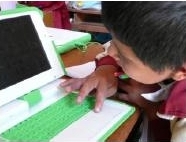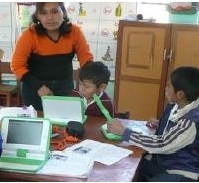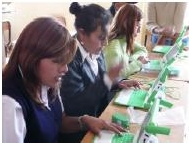Reading Carla Gomez Monroy's detailed write up of her experience with OLPC Peru at Institución Educativa Apóstol Santiago in Arahuay, I am heartened by her newfound objectivity.
Unlike her all-positive OLPC Nigeria write-up, in Peru she points out the frustrations as well as the successes in trying to establish a one-to-one computing environment with XO laptops in a poor, rural school in the Cordillera de la Viuda, 2600 meters above sea level and three hours by dirt road from Lima.
Take her description of the One Laptop Per Child distribution ceremony and the very real threat of laptop theft:
Something the teachers told us afterwards, that also impressed us, was that every single parent came to the meeting, except for two of them, even when parents had to walk incredibly long distances to make it.I'm glad she did not gloss over the need to incorporate cultural theft reduction protocols into OLPC Peru activities, in addition to the award-winning Bitfrost security system. Most thieves in rural areas like Arahuay would steal a Children's Machine as much for the show of power, as for resale or personal use.Of the parents that didn't show, three children are brothers who are fully registered in the school, and we also gave them their laptops. They will be able to use their laptops freely, as all the other children in Arahuay town, however, they will not be able to take their laptops back home on weekends until their parents come and approve that it's okay for them to take them home on weekends.
Town authorities and OLPC-in-Peru are concerned that since they go so far, they may be hurt by someone trying to steal their laptops from them, since word has spread that they have laptops. Nevertheless, the Arahuay community has committed itself to making sure the children can freely and securely use their laptops around town.
Still, Carla Gomez Monroy does give me concern when she talks about the pedagogical aims of One Laptop Per Peruvian Child:
When I'm asked how we are measuring the benefits for children of the OLPC Educational Project and what kind of parameters and evaluation methods we are using, it is hard for me to figure out what people really expect to hear:Yes, that's exactly what Ministers of Education, like those behind the Huascarán Program, of which I.E. Apóstol Santiago is a part of, want to hear. And that's why the Peruvian Ministry of Education is testing a OLPC pilot group. They are looking for objective measurements of knowledge, performance, and skill development variables. They want to say what Intel's World Ahead program reports from Classmate PC usage:That the moment children got their laptop they became smarter? That at the end of the period between moment x and moment y, the children in the laptop group performed better than those in the placebo and the no-treatment groups?
Intel Corporation is excited about the Jabi [Nigeria] experiment following the 27 per cent average score of students in the programme over others without laptops. The improvements were recorded only after its first six months in operation.But it now looks like Peru's Ministry of Education is not going to wait until November, when the objective testing is complete, before expanding One Laptop Per Child in Peru. Andia reports (via Google translation and Jose Alejandro Godoy) that the rebuilding after the recent earthquake that damaged many schools in Peru:
Is an excellent opportunity so that the delivery of scholastic computers, developed by the Massachusetts Institute of Technology (MIT), begins in the areas of the wreck and "we take advantage of this situation to give to Peru one better educative quality".In using the earthquake to change schooling in rural Peru, may the government continue with the high-level of involvement it pioneered in Arahuay - at least 8 full time staff dedicated to starting up OLPC at the school, in addition to the usual school staff and administrators.
May it also remember the people most dedicated to education; teachers. As Carla Gomez Monroy noted, teachers have multiple roles in the community that extend well beyond the classroom and their participation and enthusiasm is key for One Laptop Per Child success, no matter the country.





Thanks for reporting on this Wayan. Its important that we hear about pilot experiences from the people involved, not the PR department at OLPC.
Firstly, it irks me somewhat when people try to find quantifiable results to pilot projects. I understand that the results are important to people conducting the pilot and essentially are the whole reason for a pilot. What concerns me is how the results are interpreted.
Carla is correct when she says:
'When I'm asked how we are measuring the benefits for children of the OLPC Educational Project and what kind of parameters and evaluation methods we are using, it is hard for me to figure out what people really expect to hear'.
How exactly do you measure the benefits? The typical pilot is by necessity a short term event and not capable of showing long term benefit. A pilot wont show that in ten years from now some students will attend University and become doctors. It also wont show that some students will study building construction or others will become agriculturalists with better ways to grow food.
The effect likely to be observed from a short term pilot is the 'wonder' factor as children play with their new toy. Dont be surprised with this. Play is one of the most powerful learning tools we have as children. The collaboration tools built in to the XO laptop will be a positive and rewarding experience, much the same as children the World over play collaborative games in the schoolground.
Hopefully an OLPC game of virtual tag using the wireless network is not banned by schools as was the real game of tag banned at this school.
http://www.usatoday.com/news/health/2006-06-26-recess-bans_x.htm
A brief comment: the area considered for reconstruction after the earthquake is not exactly rural. The main place to be rebuilt, including the schools, is Pisco, a city of 200.000 inhabitants. The comment (nothing more than that) about using reconstruction as an opportunity to implement computers in schoolrooms was said in Pisco, as a promise to that city's people.
It's great to read the details of this pilot.It more or less matches the info we are getting from Uruguay, so overall I think is good news for the OLPC team. Yet, it also troubles me the evaluation from the policy experts and heads of relevant government agencies. Let's hope the peruvian pilot can have a broad assesment (qualitative as well as quantitative) in a fairly extensive period of time (at least over a year).
Wayan do you know if this Carla has published her report in Spanish as well?
While I'm glad Carla has extensive qualitative results, especially around teachers, that's not what will convince governments to buy -millions- of dollars with of computers for schools, especially right after a massive earthquake has people thinking about survival first.
And true, real long term results will be outside the scope of OLPC, as by their very nature, long term results take a long time to show.
But on the other hand, short term results, like an increase in reading comprehension, basic math skills, and writing abilities are a great indicator of future, longer term benefits that can justify a greater investment in XO laptops.
Given the short time the Cambridge team was in the town, a lot of things went wrong that only they could fix: keyboard, antenna, the kids typing during boot-up. Over a year that really adds up to a lot of broken or partly functional XO machines, unless there is local support for these kinds of problems.
Ivan Krstić has visited Arahuay 8 months later.
He interviewed the former principal of the Arahuay school, Guillermo Lazo Navarro, and the current principal, Patricia Peña Cornejo.
Their answers are (almost) too good to be true:
http://radian.org/notebook/astounded-in-arahuay
"
I wanted to hear if they thought the laptops were helping.
(Photo: the town of Arahuay.)
After looking at me blankly for a good half-minute, Mr. Navarro shot back with “evidentemente”, “obviously”, and palpably left off “you idiot” from the end of the sentence. I appreciated the small courtesy and asked a more specific question: what changed in the 8 months since the laptops arrived?
"
The detailed stories are fun to read.
Readers should take into consideration that there are those who claim every single piece of good news about the OLPC must definitely be a lie. These people feel that reality cannot be so pathological that the XO might actually help children learning. These people will gratefully explain to any readers why they should NOT believe a single word from Ivan's blog.
Winter
"To make the point concrete I devote the next third to the story of the intellectual turnaround of "Bill," a high school-aged youth in a summer work-study program for "youth at risk" in an economically depressed area of rural Maine.
Bill resented school and had virtually given up on learning if not on society itself. He had joined the project only because he would receive a small stipend, and during the first days made it quite clear that he would do only what was necessary to avoid being thrown out. But within two weeks he had become an enthusiastic participant, intellectually engaged and on his way to a level of technical expertise that astonished visiting experts on youth programs.
The simplest description of what happened is that Bill became hooked on computers. But what this lad was really "hooked on" was not the machine. It was something inside of himself: the excitement he had never known before of working on an intellectually challenging project that was truly his. And this was no one-night stand: The project was his for long enough for him to build a relationship with it; over six summer weeks he had time to feel ideas germinate in his head, to grow through persistence in the face of many setbacks and to enter the miniculture of a group of people with related interests.
The project he had chosen involved designing, building and testing computer controlled, motorized LEGO vehicles. Doing so led him to seek out and use knowledge from a variety of domains: programming, physics, engineering design and -- most unexpected for him -- mathematics. But what a difference between this encounter and those he'd known in school. Here he was acquiring knowledge for use, like learning a language by growing up in its country -- an experience quite unlike learning a language in order to pass a test. Those high-tech computerized model cars are so rich in principles of mathematics (and the same goes for other domains of knowledge) that one could well think of the experience of their builders as learning math by living in mathland -- a place that is to mathematics as France is to French. And the success of students like Bill in these environments shows that just as all children -- and not only those who "have a head for French" -- learn French if they live to France, so, too, all children learn mathematics if they meet it in a context that is more alive than the ordinary curriculum."
Bill is Peruvian!!!!!
http://www.papert.org/articles/ComputersInClassroom.html
ROTFLMAO!!!!!
@Irvin:
"Bill is Peruvian!!!!!"
And how is this relevant to the story of Ivan?
Winter